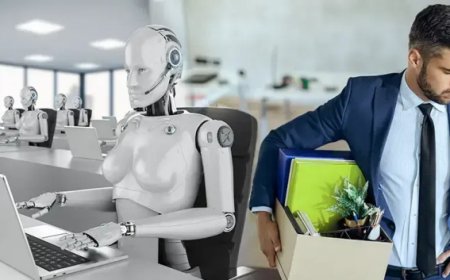Adapt or Perish
Artificial intelligence (AI) is disrupting industries across the globe, from healthcare to finance, and even manufacturing.

Artificial intelligence (AI) is disrupting industries across the globe, from healthcare to finance, and even manufacturing. Companies are rapidly integrating AI into their business models to increase efficiency, improve customer experiences, and reduce costs. However, this shift towards automation comes with significant challenges for businesses, especially those that are slow to adapt to change.
The digital age has fundamentally changed the way companies operate. Today, businesses must embrace new technologies or risk being left behind. AI is one such technology that has already started to transform the landscape of industries worldwide. According to a report by Gartner, by 2025, AI will be pervasive in almost every new software product and service, and by 2030, AI will have a profound impact on the global economy, with estimates suggesting that it could contribute up to $15.7 trillion to the world economy.
With such a significant impact, it is crucial that businesses adapt to AI or risk being left behind. The old adage "adapt or perish" has never been more relevant than it is today. Companies that do not embrace AI and the benefits it offers will struggle to remain competitive, lose market share, and ultimately, fail.
To adapt to AI, businesses must take a proactive approach to understanding how the technology can be integrated into their operations. This means identifying areas of their business that can benefit from AI and investing in the necessary tools and resources to implement AI-driven solutions.
For example, businesses can use AI to analyze vast amounts of data to identify patterns and make predictions. This can help them better understand their customers' needs, tailor their products and services to meet those needs, and deliver better customer experiences.
AI can also be used to automate processes, freeing up valuable time for employees to focus on more strategic tasks. For example, in manufacturing, AI can be used to monitor production lines, identify potential issues, and alert maintenance teams before problems occur. This can help reduce downtime and increase productivity.
Another way businesses can adapt to AI is by investing in employee training and development. With AI becoming more prevalent in the workplace, it is essential that employees are equipped with the skills necessary to work alongside AI tools and technologies.
However, adapting to AI is not just about investing in technology and training. It also requires a cultural shift within the organization. Businesses must create a culture of innovation that encourages employees to embrace new technologies and experiment with new ideas. This means fostering a work environment that values learning, collaboration, and creativity.
In conclusion, the rise of AI is disrupting industries worldwide, and businesses that do not adapt to this change risk being left behind. To survive in this new era of automation, businesses must take a proactive approach to understanding how AI can be integrated into their operations. This means investing in the necessary tools and resources, employee training and development, and fostering a culture of innovation. By embracing AI, businesses can stay competitive, deliver better customer experiences, and ultimately, thrive in the digital age.




































